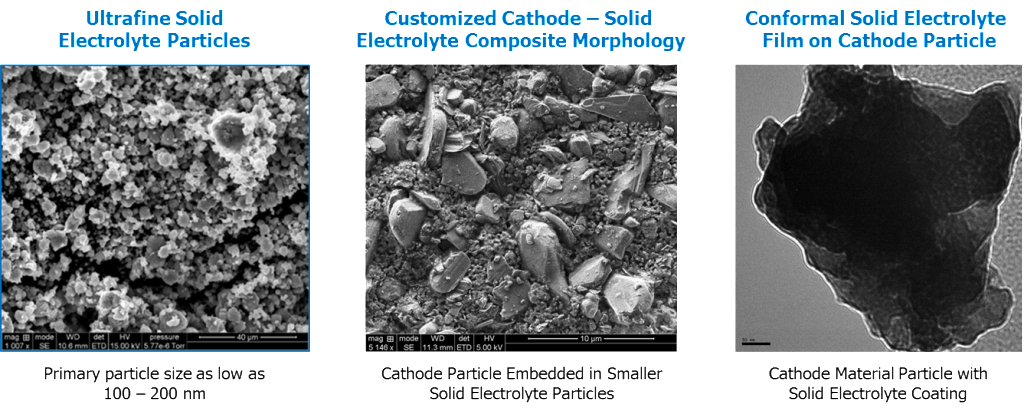High Performance Battery Materials
Cathodes, Anodes, and Electrolytes
Solid electrolytes conduct lithium ions at room temperature and can potentially replace conventional organic electrolytes, which are flammable and toxic. In addition to drastically improving the safety of the battery, solid state electrolytes allow the use of lithium metal as the anode, which in turn increases the cell voltage and thereby increases the energy density of the battery.
NEI is actively involved in producing different solid electrolyte materials of both oxide and sulfide-based compositions, such as the samples below:
Oxide-based Solid State Electrolytes
Sulfide-based Solid State Electrolytes
Among the different lithium-ion “superionic” conducting (LISICON) solid state electrolyte (SSE) materials, oxide (LISICON) and sulfide-based (thio-LISICON) compounds have shown relatively high room temperature conductivity in the range of ~10-4 to 10-7 and 10-2 to 10-4S/cm, respectively. While both oxide and sulfide-based electrolytes demonstrate high lithium conductivity at temperatures below their melting / decomposition point, thio-LISICON (Li10MP2X12; M: Si, Ge, X: S, Se) electrolytes have so far demonstrated the highest conductivity, primarily due to the higher ionic radius and higher polarizability of the sulfur ion, relative to the oxygen ion.
NEI provides solid polymer electrolytes for rechargeable solid-state lithium batteries. The electrolytes are based on specially synthesized polymers that are complexed with highly conductive lithium salts. NANOMYTE® SE-50 is a solid electrolyte that has high Li+ ionic conductivity and excellent electrochemical stability, which allows its use with 5V voltage cathode materials. It is used as the separator and is added to the electrode as well. The material has been engineered such that it provides for low interfacial resistance between the electrodes and the electrolyte. The standard form of SE-50 is a polymer-ceramic hybrid. It can also be supplied without the ceramic, with similar electrochemical properties.
NEI also supplies a PEO-based copolymer, NANOMYTE® H-Polymer. It is available with and without lithium salt (LiTFSI) added. As a 100% solid amorphous material, H-polymer combines the benefits of high room temperature ionic conductivity with good mechanical properties of a solid polymer.
NEI has also developed processes to combine cathode particles and solid electrolyte materials. For example, in a composite morphology, the cathode and solid electrolyte particles are in intimate contact with each other and evenly distributed throughout the material. Customers can specify the cathode and solid electrolyte compositions of interest, and NEI can custom produce powders with the composite morphology. Similarly, the solid electrolyte material can be deposited as a conformal film on cathode particles. Ionic conductivity measurements indicate that the ionic conductivity of the pristine solid electrolyte is largely preserved when it is combined with the cathode materials (the ionic conductivity of pristine solid electrolyte is 8 x 10-4 S/cm, whereas the ionic conductivity of solid electrolyte combined with a cathode is 5 x 10-4 S/cm). Finally, the composite material can be mixed with an ionically conducting binder and cast as a dense film. By making solid state electrolyte materials available in a more useable form, it is our intent to make it easy for Li-ion battery researchers to develop the next generation all-solid-state Li-ion batteries.

A long trusted source for custom developed materials used in lithium-ion batteries, NEI is well positioned to reproducibly synthesize small and large quantities of custom solid electrolyte compositions. The company specializes in developing new compositions and particle morphologies, including nanoscale particle engineering. NEI also has an extensive battery research and characterization facility, which includes multi-channel cell testers. By providing custom-produced solid electrolytes and testing, lithium battery developers and manufacturers are given new capabilities in enabling practical solid state batteries.